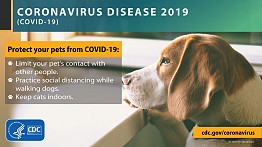Monday, October 19, 2020, 4:00PM by Aldenice De Sa Cardoso under COVID-19 and Pets
 What to do if you own pet Until we learn more about how this virus affects animals, treat pets as you would other human family members to protect them from a possible infection.
Because there is a risk that people with COVID-19 could spread the virus to animals, CDC recommends that pet owners limit their pet's interaction with people outside their household. - Keep cats indoors when possible and do not let them roam freely outside.
- Walk dogs on a leash at least 6 feet (2 meters) away from others.
- Avoid public places where a large number of people gather.
- Do not put a mask on pets. Masks could harm your pet.
There is no evidence that the virus can spread to people from the skin, fur, or hair of pets. Do not wipe or bathe your pet with chemical disinfectants, alcohol, hydrogen peroxide, or other products, such as hand sanitizer, counter-cleaning wipes, or other industrial or surface cleaners. Talk to your veterinarian if you have questions about appropriate products for bathing or cleaning your pet. Talk to your veterinarian if your pet gets sick or if you have any concerns about your pet's health. Protect pets if you are sick If you are sick with COVID-19 (either suspected or confirmed by a test), you should restrict contact with your pets and other animals, just like you would with people. Until we know more about this virus, people sick with COVID-19 should avoid contact with pets and other animals. - When possible, have another member of your household care for your pets while you are sick.
- Avoid contact with your pet including petting, snuggling, being kissed or licked, sharing food, and sleeping in the same bed.
- If you must care for your pet or be around animals while you are sick, wear a mask and wash your hands before and after you interact with them.
If you are sick with COVID-19 and your pet becomes sick, do not take your pet to the veterinary clinic yourself. Call your veterinarian and let them know you have been sick with COVID-19. Some veterinarians may offer telemedicine consultations or other plans for seeing sick pets. Your veterinarian can evaluate your pet and determine the next steps for your pet's treatment and care.
In the United States, there is no evidence that animals are playing a significant role in the spread of COVID-19. Based on the limited information available to date, the risk of animals spreading COVID-19 to people is considered to be low. However, because all animals can carry germs that can make people sick, it's always a good idea to practice healthy habits around pets and other animals. - Wash your hands after handling animals, their food, waste, or supplies.
- Practice good pet hygiene and clean up after pets properly.
- Talk to your veterinarian if you have questions about your pet's health.
- Be aware that children 5 years of age and younger, people with weakened immune systems, and older adults are more likely to sick from germs some animals can carry.
Page Last Update: Sept. 9th, 2020
|
|
Grateful Companion Clients |

